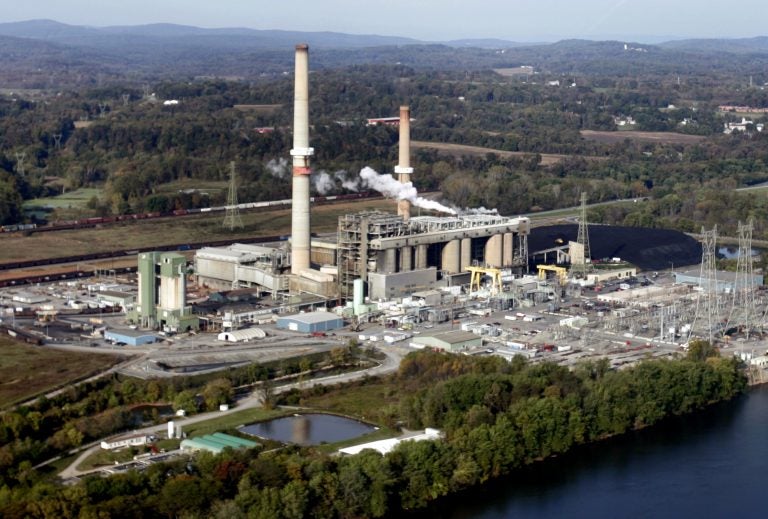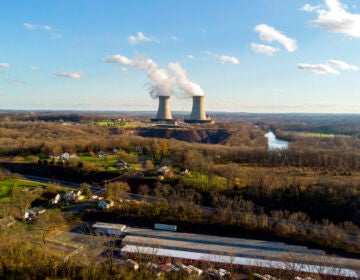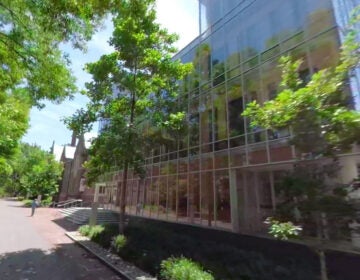Pa.’s new environmental justice policy doesn’t solve the problem, advocates say
“The community has to have a determining voice,” one critic said. “This policy doesn't do that.”

FILE - PPL's Brunner Island coal-fired plant, on the west bank of Susquehanna River, in York Haven, Pa. (Carolyn Kaster/AP Photo)
This story is part of the WHYY News Climate Desk, bringing you news and solutions for our changing region.
From the Poconos to the Jersey Shore to the mouth of the Delaware Bay, what do you want to know about climate change? What would you like us to cover? Get in touch.
For the first time in nearly two decades, the Pennsylvania Department of Environmental Protection has a new environmental justice policy.
It encourages staff to prioritize Pennsylvania communities that bear a disproportionate share of pollution and health problems when inspecting facilities and enforcing permits.
The policy revision, which went into effect last month but is still up for public comment through the end of November, was met with tough love from advocates who gathered at a public hearing in Philadelphia Thursday.
“We’re pleased with the significant revisions that have been made,” said Pamela Darville, who helps lead the activists group POWER Interfaith’s climate justice and jobs team. “[But] right now it serves as a policy guide, and there are suggestions … that a facility should adhere to — but they are only suggestions.”
Pennsylvania’s original environmental justice policy went into effect in 2004. It gave residents of “environmental justice areas” — defined as places where at least 30% of residents were people of color and/or 20% earned below the federal poverty line — extra information and engagement opportunities during the permitting process for facilities that would impact public health or the environment, such as industrial wastewater treatment plants, landfills, or mining operations.
The new policy, which officials shaped over a multi-year process of public engagement, provides for more than just enhanced public participation in the permitting process. It encourages DEP staff to prioritize environmental justice communities when inspecting facilities, enforcing rules, and distributing grant money. DEP officials have said the new policy means they could even seek higher fines for violations within environmental justice communities.
The new policy also applies in different places.
The state’s old definition of an environmental justice area was based on just two factors: race and income. The new definition uses more than 30 criteria — including asthma and cancer rates, proximity to oil and gas wells, exposure to toxic air pollution, race, and income — to produce a score reflecting both exposure and sensitivity to pollution. The new environmental justice policy applies in communities with the top 20% of scores. Officials say this new definition of environmental justice areas captures more of Pennsylvania’s rural areas than the old one.
But what the new policy does not do is direct DEP to deny or modify permit applications for new polluting facilities based on the pollution a community already faces from existing facilities nearby.
“The policy does not at all address the substantive basis of decision making,” said Mathy Stanislaus, vice provost and the director of Drexel University’s Environmental Collaboratory. “There’s been a lot of cumulative burden analysis. It is not translated into modifying a permit based on that.”
The new policy is also not binding or enforceable.
“The community has to have a determining voice,” said David Clowney, a retired philosophy professor who taught environmental ethics. “This policy doesn’t do that.”
DEP officials acknowledge these limitations, but say the policy revision is still meaningful.
“We’re not changing regulations. We’re not imposing any new requirements on the [permit] applicants,” Fernando Treviño, Pennsylvania’s special deputy secretary for environmental justice, told WHYY after the hearing. “First, we want to target our internal proceedings. …This policy actually informs … DEP staff on how to consider [environmental justice] in our decision-making process and our day-to-day.”
Treviño said the administration supports a bill pending before a Pennsylvania House committee that would explicitly allow the Department of Environmental Protection to deny permits in environmental justice areas based on the cumulative impacts of existing facilities in those communities.
“So we’ll let the legislative process follow the legislative process,” he said.

Get daily updates from WHYY News!
WHYY is your source for fact-based, in-depth journalism and information. As a nonprofit organization, we rely on financial support from readers like you. Please give today.








